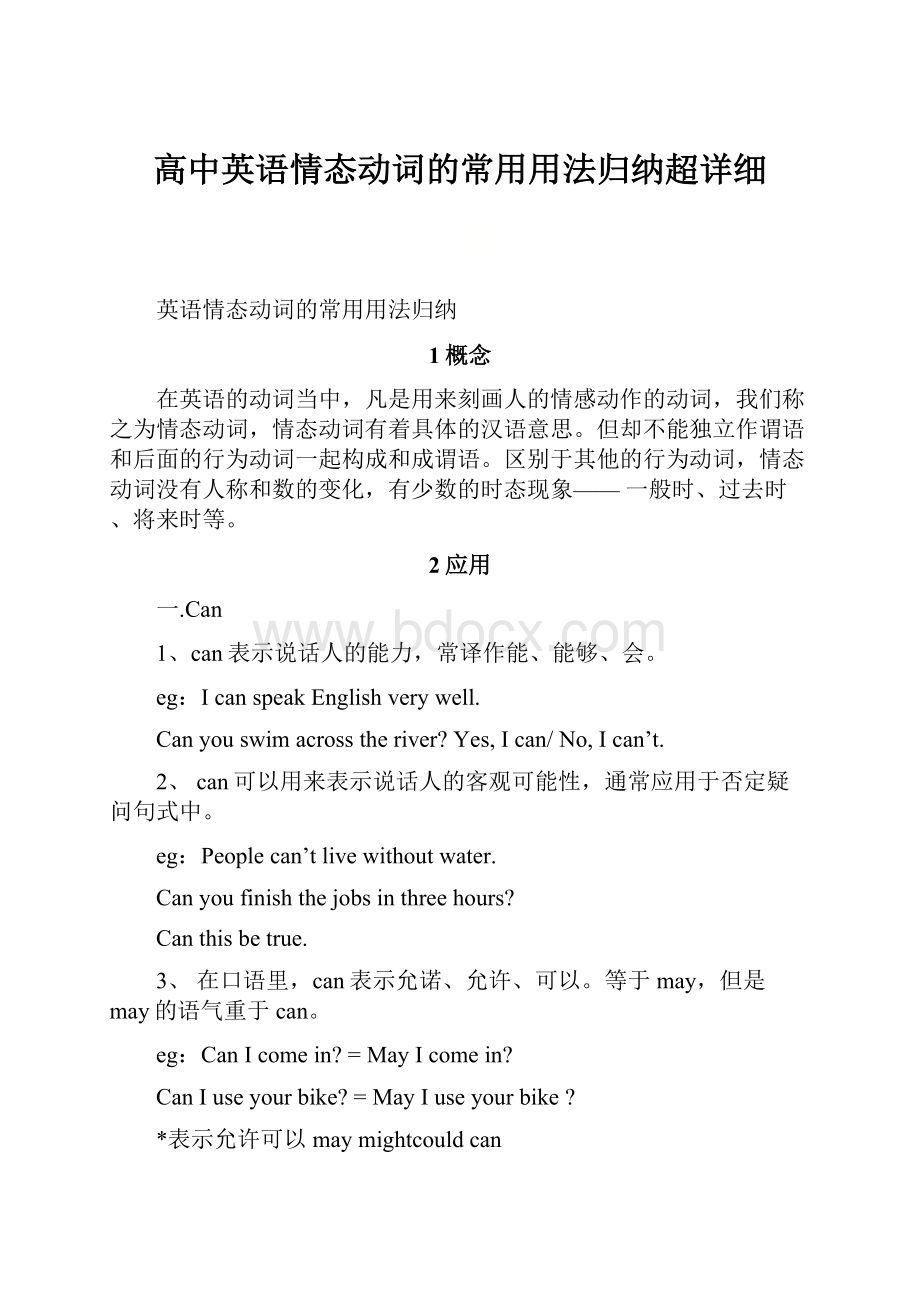高中英语情态动词的常用用法归纳超详细.docx
《高中英语情态动词的常用用法归纳超详细.docx》由会员分享,可在线阅读,更多相关《高中英语情态动词的常用用法归纳超详细.docx(10页珍藏版)》请在冰豆网上搜索。

高中英语情态动词的常用用法归纳超详细
英语情态动词的常用用法归纳
1概念
在英语的动词当中,凡是用来刻画人的情感动作的动词,我们称之为情态动词,情态动词有着具体的汉语意思。
但却不能独立作谓语和后面的行为动词一起构成和成谓语。
区别于其他的行为动词,情态动词没有人称和数的变化,有少数的时态现象——一般时、过去时、将来时等。
2应用
一.Can
1、can表示说话人的能力,常译作能、能够、会。
eg:
IcanspeakEnglishverywell.
Canyouswimacrosstheriver?
Yes,Ican/No,Ican’t.
2、can可以用来表示说话人的客观可能性,通常应用于否定疑问句式中。
eg:
Peoplecan’tlivewithoutwater.
Canyoufinishthejobsinthreehours?
Canthisbetrue.
3、在口语里,can表示允诺、允许、可以。
等于may,但是may的语气重于can。
eg:
CanIcomein?
=MayIcomein?
CanIuseyourbike?
=MayIuseyourbike?
*表示允许可以maymightcouldcan
4、在“过去时”的语境里,通常用could表示它的过去式,用beableto短语(was/were)
而could通常用来在一般现在时的语境里表示委婉语气
eg:
Could(can)youshowmethewaytothesupermarket?
5、can表示猜测
(1)对现在状态的一种猜测,只能用在否定疑问句中。
eg:
Zhangcan’tbeillreally?
Thiscan’tbedonebyhim.
(2)对现在动作的猜测
eg:
Theboycan’tbetellinglies.
Maryworkssohard,now,shecan’tbesleeping.
(3)对过去动作的一种猜测
eg:
Hecan’thavegonetothebookshopyesterday.
Mothercouldn’thavesaidit.
6、can(could)惯用法
(1)can’twaittodo迫不及待做…….
eg:
Childrencan’twaittoeatapplesinthebasket.
(2)can’thelpdoing情不自禁做某事。
eg:
WhenIheardthenewsIcan’thelplaughing.
(3)can’tbutdo不得不
eg:
Ican’tbutrefuseyou.
Wecan’tbutaskhimaboutit.
*can’tbutdo区别于haveto
haveto表示说话人在客观条件下的无奈所为,表示说话人的一种无奈情绪。
can’tbutdo强烈突出说话人内心的反抗反对情绪。
二.May
1、may表示可能性,也许、可能,通常应用于正式文体
eg:
Chinamaymakefriendswithmanypeoplealltheworld.
Bosssaidthatyoumightdrivethisnewcar.
Youmaynottakethisbookoutofthereadingroom.
2、may表示允许、允诺,口语中等于can,may比can语气强。
eg:
MayIspeakhere?
MayIgointotheroomtoseeher?
Yes,youmay.No,youmustn’t.
*may表示允诺、允许,其问句回答的排序
eg:
MayIuseyourpen?
Yes,yousureplease.ok…..
No,youmustn’tyouhadbetternotpleasedon’tyoucan’tIdon’t
thinkyoucanyoumaynot
3、might在表示上述概念时,语气更委婉
eg:
Shewasafraidthattheymightnotheridea.
Heaskedifhemightlookthroughyouralbum.
4、may表示推测,通常用于肯定句中
(1)对现在状态的一种推测。
eg:
Hemaybeverybusynow.
(2)对现在动作的一种推测。
eg:
WhereisTom?
Hemay(might)behavingbreakfastatthismoment.
(3)对过去动作的一种推测。
eg:
Wherewereyoulastnight?
ImighthavewatchedTVorhavereadthenovelathome.
5、may的固定用法
(1)may在祈使句中至于句首表示祝愿。
eg:
Mayyousucceed!
Maygodbewithyou.
Mayyoulivetobeonehundred.
(2)may在状语从句当中构成特殊的状语结构。
eg:
TheywantedtogototheChineserestauranttheymighteatthesoup.
(3)may/mightaswell+动词原形表示还是….
eg:
Youmayaswellposthimtheletteragain.
ItwassnowingImightaswellstayathome.
三.must/haveto
1、must表示必须、一定、一定要,是所有情态动词当中语气最强的,突出表现说话人的一种指责,即说话人主观上应该………
eg:
Everybodymustobeytherules.
Peoplemustdoeverythingstepbystep.
Mustwehandinourworkingplanthisweek?
Yes,youmust.No,youneedn’t/youdon’thaveto.
haveto必须、不得不、表示说话人客观条件下必须要做的事情,烘托说话人的无奈情绪。
eg:
Ihadtoanswerthesamequestionthreetimesinclass.
Ihopeyouwillhavetofinishyourschoolingthisyear.
2、must表示推测,但通常应用于肯定句式。
(1)对现在动作的一种推测mustbedoing
eg:
Youhaven’twarmclothes,youmustbefeelingcold.
(2)对现在状态的一种推测。
eg:
ZhangHuamustbeinhisroom,becausehetelephonedmefiveminutesago.
(3)对过去动作的一种推测musthavedone
eg:
Theroadiswhite,itmusthaverainedlastnight.
Youmusthavecaughtthefirsttrain,ifyouhavegotupearly.
四.need
1、need是特殊的行为动词,具有双重性,即情态动词和行为动词两种形式,通常肯定句式用行为动词形式needtodo,否定和疑问用情态动词形式。
eg:
Youneedtogotherebyyourself.
Heneedstoreaditformanytimes.
Weneedn’tworryabouthim.
HeedIfinishmyjobtoday?
NeedIcomeheretomorrow?
Yes,youneed/Yes,youneed/Yesyoushould
Yes,youmay.Yes,youmust.
正确排序:
Yes,youmust/Yes,youhaveto/Yes,yououghtto/Yes,youshould/Yes,
youneed.
2、need的特殊用法,可以表示责备。
needhavedone需要做而没有做的事。
needn’thavedone没有必要做反而做了的事。
eg:
Youneedhavedoneitthreedaysbefore.
Thetrainisclosetous,youneedn’thavehurriedtheirearly.
3、need的固定用法
needdoing=needtobedone表示被动意义
eg:
Thisyoungtreeneedswatering.
五.dare
1、dare与need一样,具有行为动词,情态动词双重性,肯定句为行为动词,否定疑问句为情态动词。
eg:
Marydarestogotherealone.
Dareyougothroughtheforestatnight?
Yes,Idare.
Shedarenotstayathomealone.
Noonedaredspeakofitagain.
2、dare的惯用法
Idaresay我敢说。
eg:
Ifyourfatherdies,whowillgetthemoney?
Idaresaymyunclewill.
六.oughtto/should
1、oughtto指说话人在道义和义务上应尽的责任和义务,使用oughtto具有一定针对性,通常是按理推断。
should表示应该,只是强调单从人说话的角度上看指劝告、建议,语气比oughtto弱。
eg:
Youarehermother;yououghttolookafterherwell.
Theyouthoughttodefendourmotherland.
Yououghttotakeyourparents’suggestion(advice).
OughtItoobeytheruleinyourclass?
Yes,yououghtto/No,yououghtn’t
Oughtn’twetodoeverythingpossibletostoppollution?
Weshouldstudyforeignlanguageveryhard.
Oneshouldbeselfish.
Weshouldencouragethenewer,forwearehisclassmates.
2、should在虚拟语气当中可以构成特殊的谓语结构
eg:
Isuggestedthathe(should)besenttothehospitalatonce.
should在虚拟语气中放在疑问,否定句中表示惊讶
eg:
Ishouldn’tworryifIwereyou.
Whyshouldshedothat?
3、oughtto,should表示责备
Oughtto(should)+bedoing
Oughtn’tto(should)+bedoing指说话人对现在动作的一种责备。
Oughtto(should)+havedone表示说话人对过去动作的一种责备。
eg:
Youshouldbewashingyourclothes,whyareyouplayinghere?
Childrenshouldn’tbewatchingthisfilm,theyshouldbeatschool.
Youshouldhavegoneoveryourlessons.
Yououghtn’ttohavewatchTYsolate.
I’mfeelingsick.Ioughtn’ttohaveeatensomuchice-cream.
七.will/shall
1、will从情态动词的角度上看,充分地体现了will的原始汉意意愿、愿意表示这一层意思will可用于多种人称。
eg:
Iwilldoeverythingforyou.
Whowillgowithme?
2、will在疑问句当中通常在和第二人称搭配,表示征询对方意见,表示….好吗?
eg:
Willyouhelpmecarrythisbox?
Willyouopenthedoorforme,please?
Won’tyoucomeover?
3、表示某种习惯或某些倾向的动作,通常是it主语
eg:
Fishwilldiewithoutwater.
What’sthematterwiththedoor?
Itwon’tlock.
Whichdoyouwant,thisorthat?
Eitherwilldo.
4、shall在应用时比较强调人称的搭配,即不同的人称代表不同的语境,shall应用于第一人称时
表示说话人征询对方意见。
eg:
Whatshallwedonext?
shall应用于第一,第三人称时,除了表示征询对方意见以外,还表示向对方委婉的请求。
eg:
ShallIopenthedoor?
Shallwesithere?
Shalltheboywaitoutside?
=Doyouwanttheboytowaitoutside?
shall应用在第二,第三人称时,表示说话人给予对方警告和命令,允许或威胁。
eg:
Youshallfailifyoudon’tworkharder.(警告)
Heshallhavethebooktillhefinishedreadingit.
Youshalldoastsay.允许
八.usedto/would
1、would表示意愿,愿意即will的过去式,语气更加委婉些,通常是will发生在从句里。
eg:
Hesaidthathewouldtryhisbesttohelpus.
Don’tworry,IpromisedthatIwoulddo.
would在表达will的意愿,愿意的语气时,通常会形成特殊的句型,句式。
eg:
Wouldyoupleasehavelunchwithus?
Wouldyoupassmethebookonthedesk?
Wouldyoulikemetocarryitforyou?
Thatwouldbekindofyou.
2、would表示过去常常,即主语常有的一种习惯,但只局限于过去某一阶段的动作。
eg:
Iwoulddrinkgreentea.
Whenhewasyoung,hewouldsmokealot.
Ihavestillremembertheboy,Heusedtoasksomestupidquestions.
3、would可以用在特殊的语境里,表示说话人的情感或情绪上的宣泄,常用于否定句,肯定句,不用再疑问句里。
eg:
Idon’treallyunderstandyou,why?
----No,youwouldn’t.(不指望你明白)
4、would的惯用法
would可以用在虚拟语气中
eg:
Iwishtherainwouldstopforamoment.
Wouldratherdothando?
wouldminddoing做……你介意吗?
eg:
Wouldyoumindopeningthewindow?
5、usedto过去常常
(1)和would比较起来,usedto强调过去常常发生的某事而现在不是。
usedto没有其他的词形变化,不能与其他的情态动词连用,表示从前经常发生的动作现在却不复存在了。
eg:
Myuncleusedtotakecoldbathinwinter.
Jamsusedtohavefatmeat.
(2)usedto有时根据上下文可判定usedto后面的成分,所以情态动词usedto后面的行为动词可省略。
eg:
Ican’tstandasmuchasIusedto.
(3)usedto的否定形式
在usedto前面用didn’t表示
Ididn’tusetosmoke.
在usedto前面加never
WhenIwasasyoungasyou,studentsneverusedtosayanythingagainsttheirteachers.
在usedto后面加not
Thewomaninourofficeusednottocleantheroom.
(4)usedto在反意疑问句中的表示
eg:
Johnusedtobeapoliceman,didn’the?
/usednothe?
--------Yes,hedid.No,hedidn’t.
--------Yes,heusedto.No,heusedn’tto
九.hadbetter
最好---;应该-----(=should约等于oughtto)
1、与第一人称I,we连用时,表示说话人的某种意向。
eg:
Ithinkwehadbetterwearwarmclothesinthisseason.
Wehadbetterwaitforherforamoment.
2、与第二人称连用时,表示说话人的忠告,劝告。
eg:
Youhadbettergoimmediatelylestyoumissthegoodchance.
Youhadbetterreadthetestagainandagain.